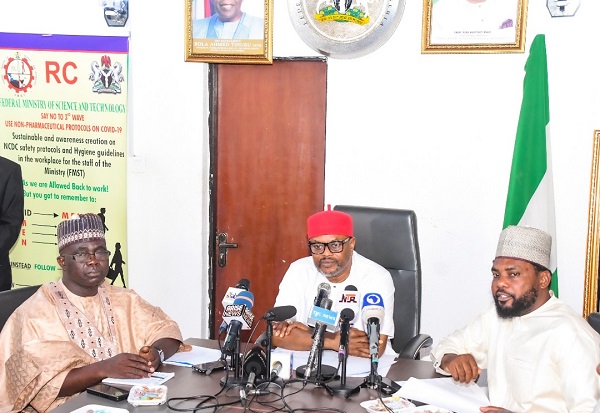
The Minister of Innovation, Science and Technology, Chief Uche Nnaji has hailed Presidential Executive Order No. 5 as a visionary and transformative policy for the science and technology sector in Nigeria.
He emphasised that the executive order is designed to drive innovation, promote science and technology, and catalyse Nigeria’s economic diversification, technological advancement, and the promotion of domestic and foreign investments. The policy also aims to reduce dependence on foreign goods, alleviate the strain on the naira, facilitate massive job creation and spur industrial growth.
Nnaji made these remarks during a press briefing held on October 6, 2023, at the ministry’s headquarters in Abuja, where he discussed the readiness for and implementation of Presidential Executive Order No. 5.
The minister highlighted that the executive order aligns with and catalyses President Bola Tinubu’s 8-point Renewed Hope Agenda. He emphasised that despite Nigeria’s vast and largely untapped natural resources, the country faces youth unemployment challenges and an overreliance on imported products, which leads to the exportation of domestic jobs.
Presidential Executive Order No. 5 addresses these issues by providing support for made-in-Nigeria goods and services (MNGS). It also encourages the development of homegrown capabilities to maintain, redesign, reproduce, rededicate and duplicate infrastructure built in Nigeria, fostering self-reliance and development.
Furthermore, the order aims to monitor and promote the capacity of Nigerian professionals and contractors in science, engineering, and technological programmes, enabling them to compete on a global scale. To facilitate these objectives, the Strategic Implementation Task Office of the Executive Order (SITOPEo. 5) will collaborate with the Presidential Monitoring and Evaluation Council. Additionally, the National Office for Technology Acquisition and Promotion (NOTAP) maintains a database of Nigerian professionals for project execution.
Nnaji underscored the importance of various policies and programmes that are in the advanced stages of finalisation. These strategies include:
National Strategy for Competitiveness in Raw Materials and Products Development: This strategy aims to shift Nigeria from an oil and gas-dependent economy to harnessing diverse raw materials for high-quality made-in-Nigeria products.
National Leather and Leather Products Policy (NLLPP): NLLPP seeks to reposition Nigeria’s leather industry by producing high-quality, finished leather products instead of exporting raw materials.
National Policy on Welding and Related Fields: This policy addresses the influx of foreign welding personnel and promotes the training and certification of Nigerian welders to global standards.
Methanol Fuel Technology Programme: This programme aims to harness the potential of methanol as a clean and sustainable energy source, potentially creating over 40 million employment opportunities in two years.
Technology and Innovation Centres: These centres unify stakeholders in the science, technology and innovation ecosystem to transition Nigeria from a resource-based to a knowledge economy.
Promotion of Locally Invented Digital Addressing Technology: This initiative addresses the need for efficient navigation and addressing systems for governance and daily activities.
Nigeria National Innovation Commercialisation Programme (NICP): NICP fosters scientific research, technological innovation, commercialisation and mainstreaming of made-in-Nigeria goods and services.
Clean Technology Programme: This initiative supports startups and MSMEs innovatively addressing climate change with cutting-edge technologies, products, and services, particularly in the energy transition and renewables space.
Manufacturing Nigeria: This initiative seeks to increase Nigeria’s manufacturing capacity by tackling primary bottlenecks, such as dedicated power, locally made machines and spares, and technical knowledge.
Nnaji emphasised President Tinubu’s administration’s commitment to solving Nigeria’s challenges through innovation and technology. He believes that the executive order will create a conducive environment for nurturing the innovative spirit of Nigerian youth and entrepreneurs, leading to economic growth, job creation, poverty reduction and a brighter future for the country.


